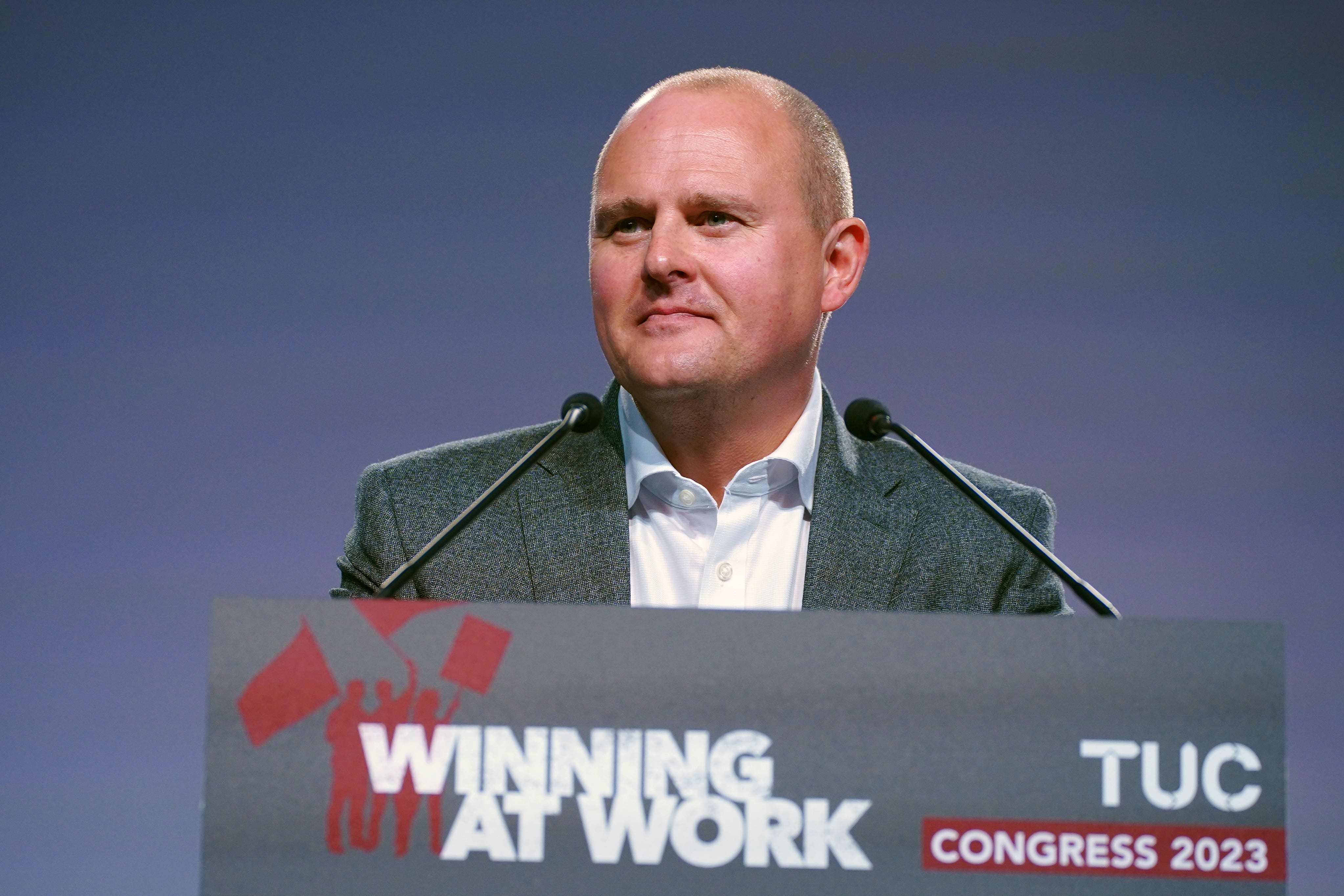Unions to step up opposition to new law on strikes
The TUC is holding its first special conference in more than 40 years.

The Government’s controversial new law to provide minimum levels of service during strikes will be attacked on Saturday at a special conference attended by leaders of the country’s biggest trade unions.
The TUC has called its first special national conference in more than 40 years as it steps up opposition to new regulations announced by ministers following 18 months of strikes by hundreds of thousands of workers over pay and conditions.
Metro mayors and council leaders from across the UK have warned that the new law will make disputes harder to solve and lead to more frequent and longer strikes, the TUC announced.
We will not rest until the law is repealed and we are determined to explore every avenue of non-compliance
The mayors of London, Greater Manchester, Liverpool, West Yorkshire, South Yorkshire, Bristol and North of Tyne, and council leaders of Birmingham, Cardiff, Glasgow, Leeds, Liverpool, Newcastle, Nottingham and Sheffield, have joined forces to issue a “scathing statement” on minimum service levels, said the TUC.
The leaders of towns and cities are said to have pledged to “work with trades unions and employers to explore every possible option to avert any prospect of work notices being issued in our areas”.
TUC general secretary Paul Nowak said: “This statement from mayors and council leaders across Britain is the latest in a long list of scathing criticism for minimum service levels.
“Employers, politicians and civil society organisations have all condemned this legislation. It’s little wonder so many are opposed to these new laws. They are a deliberate attempt to restrict the right to strike – a fundamental British liberty.”
RMT will not willingly comply with this legislation and will support in whatever ways are practical, other unions who want to engage in acts of tactical non-compliance
He said Saturday’s conference will send a strong message to ministers and employers that unions believe the new law is unworkable, unnecessary and illegal.
“We will set out what we will do to resist this legislation and to make sure it is never used to undermine a strike,” he told the PA news agency.
“We will not rest until the law is repealed and we are determined to explore every avenue of non-compliance.”
Mick Lynch, general secretary of the Rail, Maritime and Transport union (RMT), will tell the conference: “The mass strike wave that our union and others played a major role in is still continuing in various sectors and smaller, regional industrial disputes are still ongoing throughout the country.
This is one of the worst attacks on workers’ rights in living memory. Rather than attacking our right to strike, ministers should be addressing why people take strike action
“Although the rate of inflation is not climbing as fast as before, there is still real demand amongst working people for pay justice in the workplace and a continuing struggle for decent terms and conditions.
“In the lead-up to Christmas when several unions still have strike mandates, including our own on London Underground, Government ministers have been stepping up their rhetoric that they won’t allow strike action to disrupt Christmas.
“Importantly, the Government has left the issue of work notices to the discretion of employers and it will only apply at the moment to Department for Transport mandated train operators, ambulance workers and other groups of workers deemed “key” such as border force staff.
“It is vital that unions come together to pressure the devolved administrations in Scotland, Wales and the regional mayors to make a pledge never to issue a work notice if there is a breakdown in industrial relations.
“Isolating Westminster politically will show that the Tory Government alone wants minimum service legislation implemented.”
Strikes cause stress and disruption to passengers and businesses and, whilst there is no silver bullet to mitigating the disruption from strikes, these regulations deliver a manifesto promise and will enable employers to reduce the impact from strikes
Mr Lynch said the RMT will be writing to employers calling on them not to use the so-called work notices to ensure a minimum service level, warning that if they fail to give satisfactory guarantees the union will have to consider having industrial disputes with them.
He added: “I have been equally clear that RMT will not willingly comply with this legislation and will support in whatever ways are practical, other unions who want to engage in acts of tactical non-compliance.”
Public and Commercial Services (PCS) union general secretary Mark Serwotka said: “This is one of the worst attacks on workers’ rights in living memory. Rather than attacking our right to strike, ministers should be addressing why people take strike action.”
Rail minister Huw Merriman said: “Strikes cause stress and disruption to passengers and businesses and, whilst there is no silver bullet to mitigating the disruption from strikes, these regulations deliver a manifesto promise and will enable employers to reduce the impact from strikes.
“As the Government, we have a duty to ensure the public can access key services, and while it is important workers maintain their ability to strike, this must not come at the cost of people getting to work, accessing healthcare or education.”
Bookmark popover
Removed from bookmarks